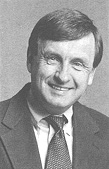|
D E A N ' S M E S S A G E ...........................................................................................................
The influential Institute of Medicine's The Future of Public Health, identified three basic functions of public health: assessment, policy development, and assurance. You will see evidence of the priorities given to these basic functions in this issue of your alumni magazine.
Likewise, epidemiologist John Young appreciate the value of assessment in fighting cancer. In courses they present throughout the world, these faculty members teach others how to set up and maintain registries to track all types of cancer, leading to discoveries of trends, patterns, and causes of cancer that direct interventions to prevent or treat the disease. Furthermore, these cancer registries help public health professionals develop policies to prioritize scarce resources in specific regions. For example, the Surveillance, Epidemiology, & End Results (SEER) program, which Young directs, has identified high rates of invasive cervical cancer among black women in rural Georgia, underscoring the need for more effective prevention efforts. Kenneth Thorpe, newly arrived to our faculty as the chair of the Department of Health Policy and Management, also demonstrates how the functions of public health come to play in solving the challenge of uninsured Americans. As a member of President Clinton's Health Care Reform Task Force, Ken Thorpe participated in a nationwide assessment of the scope of the problem; current data identify more than 43 million Americans without health insurance. Although comprehensive health care reform is not on the immediate federal horizon, Ken Thorpe and his colleagues continue to provide evidence-based assessments of current policies and guidance for the future. We do not have unlimited resources for the public's health, but with thorough assessment, informed policy development, and assurance that resources are allocated in the best way, we can direct support to insuring Americans, attacking cancer, curbing school violence, and the other pressing public health problems of the new millennium. |
Fall 1999 Issue | Dean's Message | School Sampler | An Education in Violence
Policy Maker | WHSC | RSPH
Copyright © Emory University, 1999. All Rights Reserved.
Send comments to
hsnews@emory.edu.

 Assessment is an essential beginning
to understanding
the health challenges of our nation and world. It is a vital tool in the work of Arthur
Kellermann, who directs the Center for Injury Control and chairs the Department of Emergency
Medicine at Emory. In compiling research on school violence for the past
15 years, he and his colleagues have
found no ready-made, fast, or easy solutions for solving the situations such as those that
Columbine and Heritage high schools brought vividly before us in the past year. However,
through information gathered by assessment and surveillance, his team has made
recommendations on ways to stop school violence, and they use that information to help
legislators make more effective policies.
Assessment is an essential beginning
to understanding
the health challenges of our nation and world. It is a vital tool in the work of Arthur
Kellermann, who directs the Center for Injury Control and chairs the Department of Emergency
Medicine at Emory. In compiling research on school violence for the past
15 years, he and his colleagues have
found no ready-made, fast, or easy solutions for solving the situations such as those that
Columbine and Heritage high schools brought vividly before us in the past year. However,
through information gathered by assessment and surveillance, his team has made
recommendations on ways to stop school violence, and they use that information to help
legislators make more effective policies.